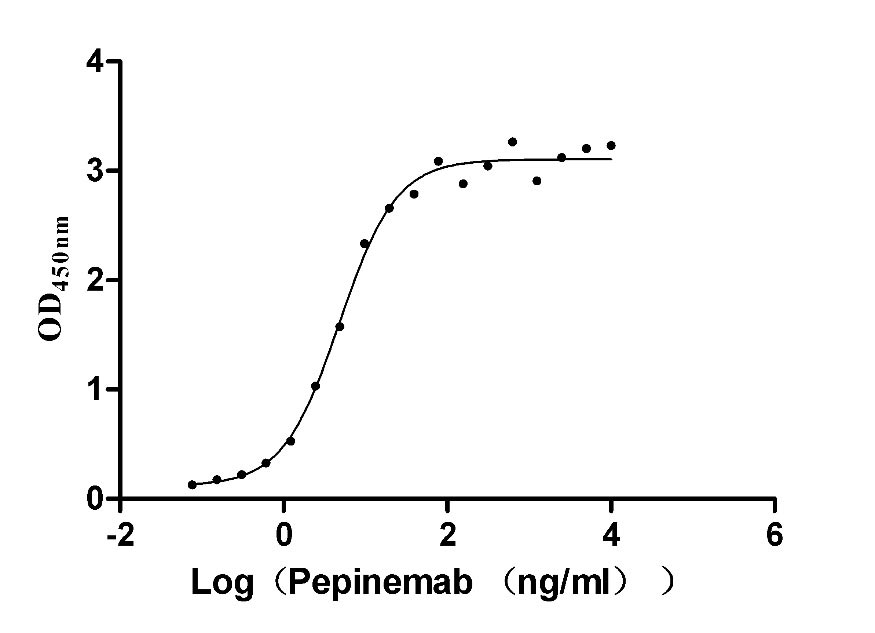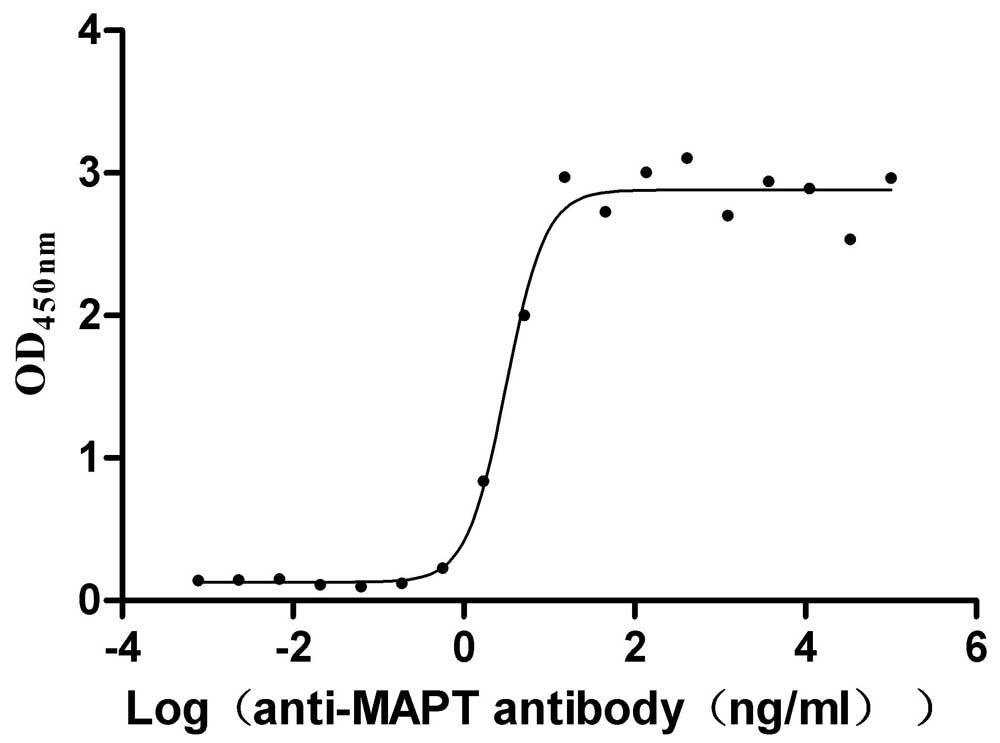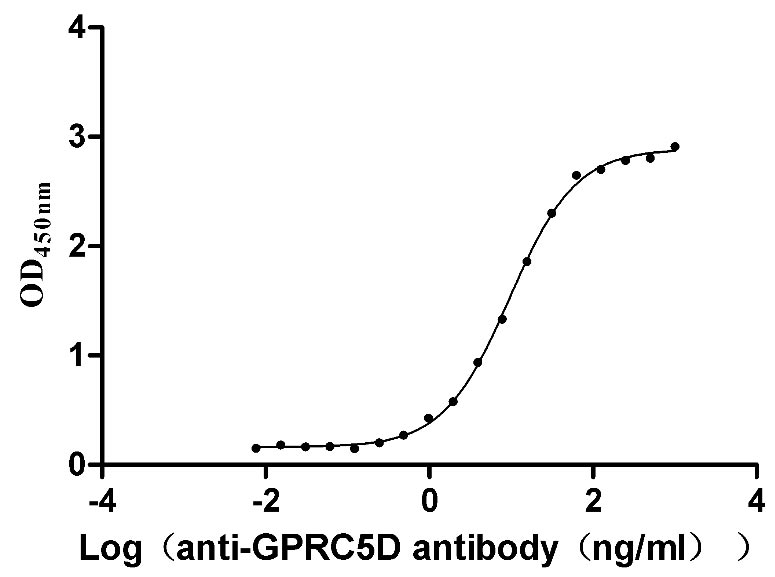Recombinant Human Peroxisomal biogenesis factor 19 (PEX19)
-
中文名稱:人PEX19重組蛋白
-
貨號:CSB-YP017802HU
-
規(guī)格:
-
來源:Yeast
-
其他:
-
中文名稱:人PEX19重組蛋白
-
貨號:CSB-EP017802HU-B
-
規(guī)格:
-
來源:E.coli
-
共軛:Avi-tag Biotinylated
E. coli biotin ligase (BirA) is highly specific in covalently attaching biotin to the 15 amino acid AviTag peptide. This recombinant protein was biotinylated in vivo by AviTag-BirA technology, which method is BriA catalyzes amide linkage between the biotin and the specific lysine of the AviTag.
-
其他:
-
中文名稱:人PEX19重組蛋白
-
貨號:CSB-BP017802HU
-
規(guī)格:
-
來源:Baculovirus
-
其他:
-
中文名稱:人PEX19重組蛋白
-
貨號:CSB-MP017802HU
-
規(guī)格:
-
來源:Mammalian cell
-
其他:
產(chǎn)品詳情
-
純度:>85% (SDS-PAGE)
-
基因名:
-
Uniprot No.:
-
別名:33 kDa housekeeping protein; D1S2223E; HK33; Housekeeping gene 33kD; OK/SW-cl.22; PBD12A; Peroxin 19; Peroxin-19; Peroxisomal biogenesis factor 19; Peroxisomal farnesylated protein; PEX19; PEX19_HUMAN; PMP1; PMPI; PXF; PXMP1
-
種屬:Homo sapiens (Human)
-
蛋白長度:Full Length of Mature Protein
-
表達(dá)區(qū)域:2-296
-
氨基酸序列AAAEEGCSV GAEADRELEE LLESALDDFD KAKPSPAPPS TTTAPDASGP QKRSPGDTAK DALFASQEKF FQELFDSELA SQATAEFEKA MKELAEEEPH LVEQFQKLSE AAGRVGSDMT SQQEFTSCLK ETLSGLAKNA TDLQNSSMSE EELTKAMEGL GMDEGDGEGN ILPIMQSIMQ NLLSKDVLYP SLKEITEKYP EWLQSHRESL PPEQFEKYQE QHSVMCKICE QFEAETPTDS ETTQKARFEM VLDLMQQLQD LGHPPKELAG EMPPGLNFDL DALNLSGPPG ASGEQC
-
蛋白標(biāo)簽:Tag?type?will?be?determined?during?the?manufacturing?process.
The tag type will be determined during production process. If you have specified tag type, please tell us and we will develop the specified tag preferentially. -
產(chǎn)品提供形式:Lyophilized powder
Note: We will preferentially ship the format that we have in stock, however, if you have any special requirement for the format, please remark your requirement when placing the order, we will prepare according to your demand. -
復(fù)溶:We recommend that this vial be briefly centrifuged prior to opening to bring the contents to the bottom. Please reconstitute protein in deionized sterile water to a concentration of 0.1-1.0 mg/mL.We recommend to add 5-50% of glycerol (final concentration) and aliquot for long-term storage at -20℃/-80℃. Our default final concentration of glycerol is 50%. Customers could use it as reference.
-
儲存條件:Store at -20°C/-80°C upon receipt, aliquoting is necessary for mutiple use. Avoid repeated freeze-thaw cycles.
-
保質(zhì)期:The shelf life is related to many factors, storage state, buffer ingredients, storage temperature and the stability of the protein itself.
Generally, the shelf life of liquid form is 6 months at -20°C/-80°C. The shelf life of lyophilized form is 12 months at -20°C/-80°C. -
貨期:Delivery time may differ from different purchasing way or location, please kindly consult your local distributors for specific delivery time.Note: All of our proteins are default shipped with normal blue ice packs, if you request to ship with dry ice, please communicate with us in advance and extra fees will be charged.
-
注意事項:Repeated freezing and thawing is not recommended. Store working aliquots at 4°C for up to one week.
-
Datasheet :Please contact us to get it.
相關(guān)產(chǎn)品
靶點詳情
-
功能:Necessary for early peroxisomal biogenesis. Acts both as a cytosolic chaperone and as an import receptor for peroxisomal membrane proteins (PMPs). Binds and stabilizes newly synthesized PMPs in the cytoplasm by interacting with their hydrophobic membrane-spanning domains, and targets them to the peroxisome membrane by binding to the integral membrane protein PEX3. Excludes CDKN2A from the nucleus and prevents its interaction with MDM2, which results in active degradation of TP53.
-
基因功能參考文獻(xiàn):
- Thus, PEX19 and PEX3 peroxisome biogenesis factors provide an alternative posttranslational route for membrane insertion of the reticulon homology domain-containing proteins, implying that endoplasmic reticulum membrane shaping and peroxisome biogenesis may be coordinated. PMID: 29396426
- The results demonstrate an allosteric mechanism for the modulation of PEX19 function by farnesylation. PMID: 28281558
- that newly synthesized UBXD8 is post-translationally inserted into discrete ER subdomains by a mechanism requiring cytosolic PEX19 and membrane-integrated PEX3, proteins hitherto exclusively implicated in peroxisome biogenesis PMID: 27295553
- suggest a novel regulatory mechanism for peroxisome biogenesis through the interaction between Pex19p and PLA/AT-3 PMID: 26018079
- Thus within the cell, PEX3 is stabilized by PEX19 preventing PEX3 aggregation. PMID: 25062251
- PEX19 formed a complex with the peroxisomal tail anchored protein PEX26 in the cytosol and translocated it directly to peroxisomes by a TRC40-independent class I pathway. PMID: 23460677
- PEX3-PEX19 interaction is crucial for de novo formation of peroxisomes in peroxisome-deficient cells. PMID: 22624858
- The Pex19p peptide contains a characteristic motif, consisting of the leucine triad (Leu18, Leu21, Leu22), and Phe29, which are critical for the Pex3p binding and peroxisome biogenesis. PMID: 21102411
- The crystal structure of the cytosolic domain of PEX3 in complex with a PEX19-derived peptide. PEX3 adopts a novel fold that is best described as a large helical bundle. PMID: 20554521
- data indicate a divided N-terminal and C-terminal structural arrangement in Pex19p, which is reminiscent of a similar division in the Pex5p receptor, to allow separation of cargo-targeting signal recognition and additional functions. PMID: 20531392
- a considerable functional diversity of the proteins encoded by two PEX19 splice variants and thereby provide first experimental evidence for specific biological functions of the different predicted domains of the PEX19 protein. PMID: 11883941
- PEX19 binds and stabilizes newly synthesized PMPs in the cytosol, binds to multiple PMP targeting signals (mPTSs), interacts with the hydrophobic domains of PMP targeting signals, and is essential for PMP targeting and import. PMID: 14709540
- Interaction of PEX3 and PEX19 visualized by fluorescence resonance energy transfer (FRET). PMID: 14713233
- Pex19p has a role in assembly of PTS-receptor docking complexes PMID: 14715663
- Results suggest that PEX3 plays a selective, essential, and direct role in class I peroxisomal membrane protein import as a docking factor for PEX19. PMID: 15007061
- human Pex19p domain architecture and activity PMID: 15252024
- analysis of the PEX19-binding site of human adrenoleukodystrophy protein PMID: 15781447
- Pex19p translocates the membrane peroxins from the cytosol to peroxisomes in an ATP- and Pex3p-dependent manner and then shuttles back to the cytosol PMID: 16280322
- Pex19p binds to PMP70 co-translationally and keeps PMP70 in a proper conformation for the localization to peroxisome. PMID: 16344115
- Nonfarnesylated and farnesylated human Pex19p display a similar affinity towards a select set of peroxisomal membrane proteins. PMID: 16791427
- Data suggest that Pex19p probably functions as a chaperone for membrane proteins and transports them to peroxisomes by anchoring to Pex3p using residues 12-73 and 40-131. PMID: 16895967
- either one or two tryptophan residues of Pex3p (Trp-104 and Trp-224) are directly involved in binding to Pex19p. PMID: 18174172
- targeting of hFis1 to peroxisomes and mitochondria are independent events and support a direct, Pex19p-dependent targeting of peroxisomal tail-anchored proteins. PMID: 18782765
- N-terminal domain of Pex14, Pex14(N), adopts a three-helical fold. Pex5 and Pex19 ligand helices bind competitively to the same surface in Pex14(N) albeit with opposite directionality. PMID: 19197237
- ALDRP interacts with PEX19 splice variants PEX19-delta-E2 and PEX19-delta-E8. PMID: 11883941
- LDRP (ABCD2) interacts with both farnesylated wild-type and farnesylation-deficient mutant PEX19. This interaction is mediated by amino acids 1-218 of ALDRP. PMID: 10777694
- MP70 (ABCD3) interacts with both farnesylated wild-type and farnesylation-deficient mutant PEX19. PMID: 10777694
- MP70 interacts with PEX19 splice variants PEX19-delta-E2 and PEX19p-delta-E8. PMID: 11883941
顯示更多
收起更多
-
相關(guān)疾病:Peroxisome biogenesis disorder complementation group 14 (PBD-CG14); Peroxisome biogenesis disorder 12A (PBD12A)
-
亞細(xì)胞定位:Cytoplasm. Peroxisome membrane; Lipid-anchor; Cytoplasmic side.
-
蛋白家族:Peroxin-19 family
-
組織特異性:Ubiquitously expressed. Isoform 1 is strongly predominant in all tissues except in utero where isoform 2 is the main form.
-
數(shù)據(jù)庫鏈接:
Most popular with customers
-
Recombinant Human Semaphorin-4D (SEMA4D), partial (Active)
Express system: Mammalian cell
Species: Homo sapiens (Human)
-
Recombinant Human Insulin growth factor-like family member 1 (IGFL1) (Active)
Express system: Mammalian cell
Species: Homo sapiens (Human)
-
Recombinant Macaca mulatta Microtubule-associated protein tau (MAPT) (Active)
Express system: Mammalian cell
Species: Macaca mulatta (Rhesus macaque)
-
Recombinant Human Angiopoietin-2 (ANGPT2) (Active)
Express system: Mammalian cell
Species: Homo sapiens (Human)
-
Recombinant Human G-protein coupled receptor family C group 5 member D (GPRC5D)-VLPs (Active)
Express system: Mammalian cell
Species: Homo sapiens (Human)
-
Recombinant Macaca fascicularis Membrane spanning 4-domains A1 (MS4A1)-VLPs (Active)
Express system: Mammalian cell
Species: Macaca fascicularis (Crab-eating macaque) (Cynomolgus monkey)
-
Recombinant Human Myosin regulatory light polypeptide 9 (MYL9) (Active)
Express system: Yeast
Species: Homo sapiens (Human)
-
Recombinant Human Cadherin-17 (CDH17), partial (Active)
Express system: Mammalian cell
Species: Homo sapiens (Human)





-AC1.jpg)














